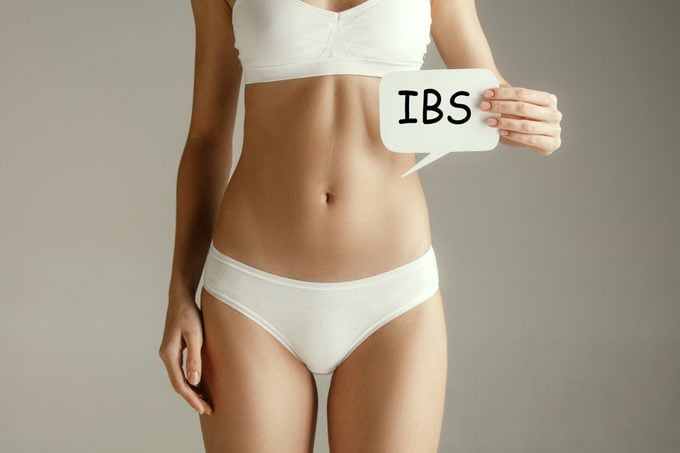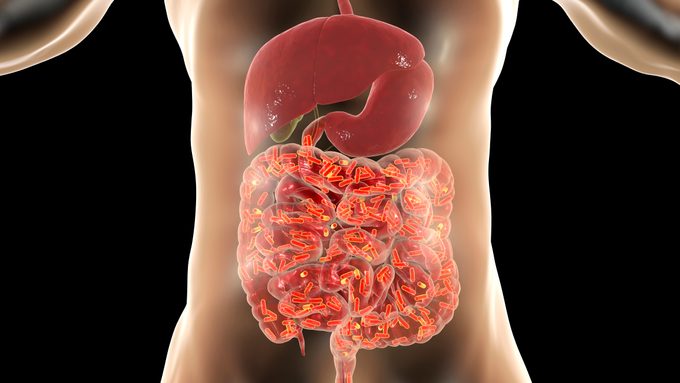The IBS Symptoms, Causes, and Treatments Everyone Should Know
Updated: Mar. 11, 2022
Is your constipation, diarrhea, or belly pain a touch of food poisoning—or something more serious? Here's how to tell if your gastrointestinal symptoms could be irritable bowel syndrome, and what to do to treat this common chronic condition.

Irritable bowel syndrome (IBS) is one of the most common gastrointestinal conditions you can get. It’s defined as abdominal pain or discomfort with, ahem, “altered” bowel habits over a period of time. In other words, if your life often revolves around finding the nearest bathroom or you can’t do things you enjoy because of belly pain, you might have IBS.
If you get a belly ache or diarrhea after eating day-old sushi, you probably don’t. People with IBS might have ongoing diarrhea, constipation, or both—along with stomach cramps, pain, bloating, and fatigue.
On This Page
What Is Irritable Bowel Syndrome?
If you have IBS, you have ongoing gastrointestinal symptoms that can’t be easily explained by other conditions and you have no signs of gastrointestinal tract damage that can occur with conditions like Crohn’s disease and ulcerative colitis (which are autoimmune-related inflammatory bowel diseases). In other words, to make a diagnosis of IBS, your doctor will likely rule out all other explanations.
Between 10 percent and 15 percent adults in the United States have IBS. Symptoms of IBS are more common in women than men, and it occurs less often over age 50. It’s rarely a life-threatening condition.
However, it’s important to get a diagnosis and treatment. Your gastrointestinal system, or gut, contains a universe of fungi, viruses, and genetic material that reveals a lot about your overall health, including your emotional state, according to the American Gastroenterological Association. Anything that affects it, including IBS, needs attention, because poor gut health can throw your whole system out of whack and reduce your quality of life.
IBS Symptoms
Irritable bowel syndrome is a symptom-based disorder, so your treatment goals will most likely be aimed at resolving physical complaints such as pain, bloating, cramping, and diarrhea or constipation. No two cases of IBS are exactly alike, so doctors depend on broad categories that lead to diagnoses and treatments. There are three types of IBS: Irritable bowel syndrome with constipation (IBS-C), irritable bowel syndrome with diarrhea (IBD-D), and irritable bowel syndrome with mixed bowl habits (IBS-M).
Here are some common IBS symptoms and risk factors to watch for:
- Diarrhea
- Constipation
- Stomach cramps
- Abdominal pain
- Bloating
- Fatigue
IBS Causes
IBS doesn’t have one cause, but many factors contribute to or worsen this condition. The precise causes of IBS are often hard to identify. Stress and anxiety can contribute, as can lack of sleep. Women are twice as likely to have IBS, in part because hormonal changes can contribute to symptoms.
Researchers are now learning that negative emotional states play a major role in gut functioning, and see stress reduction as an important step for easing symptoms and reducing flare-ups.
That said, here are some factors that can exacerbate or cause gastrointestinal distress, particularly diarrhea.
- Lactose intolerance or other food sensitivities
- Caffeine intake
- Alcohol intake
- Gastrointestinal infections (giardia, HIV)
- Inflammatory bowel disease
- Medication-induced diarrhea (antibiotics, proton pump inhibitor, nonsteroidal anti-inflammatory drugs, ACE inhibitor, chemotherapy)
- Celiac disease or other food intolerances
- Colorectal cancer or other malignancies
- Hyperthyroidism
Here are others factors that are linked to, can exacerbate, or trigger gastrointestinal distress, particularly constipation.
- Inadequate fiber intake
- Medication (opiates, calcium-channel blockers, antidepressants, clonidine)
- Parkinson’s disease
- Multiple sclerosis
- Emotional stress
- Spinal injury
- Diabetes
- Hypothyroidism
- Bowel obstruction
- Endometriosis
- Diverticulitis

IBS Prevention
There’s no way to prevent IBS, but there are things you can do to feel better and extend the time between flares and make them less intense when they do come.
These include not smoking, identifying and avoiding the foods that make your symptoms worse, exercising and avoiding caffeine.
IBS Treatments
While there’s no specific test to diagnose IBS, it’s important that your provider makes sure you don’t actually have inflammatory bowel disease (IBD) before doing anything else. Although they sound similar and share many symptoms, IBD is a more serious condition and requires different treatment.
To identify the causes and potential treatment for your IBS, your doctor will most likely do lab tests (including one for gluten intolerance), order stool studies to check for infection or to make sure your body is absorbing nutrients correctly, obtain imaging tests like X-rays or a colonoscopy, and more. If your IBS is caused by an underlying chronic condition such as Parkinson’s disease your doctor will treat the condition as well as your IBS symptoms.
Treatments for IBS may include:
- Fiber-rich foods, fiber supplements, and laxatives
- Medications such as the anti-diarrheal loperamide (Imodium); prescription probiotics; aldosterone, a steroid hormone specifically used to treat IBS in women; or rifaximin, an antibiotic
- Increased physical activity, which can boost digestion
- A change in medication, if side effects are causing symptoms
- Antidepressants, including low-dose tricyclic antidepressants or serotonin reuptake inhibitors, especially in patients with constant and chronic abdominal symptoms
- Other prescription drugs include alosetron (Lotronex), eluxadoline (Viberzi), linaclotide (Linzess), and lubiprostone (Amitiza), which may be appropriate only for certain subgroups of patients (such as those who have IBS-C or IBS-D) or those who haven’t responded to other treatments.
Another category deserves its own discussion: Natural treatments and self-care for IBS. Foods such as wheat products, onions, fruits, vegetables, sorbitol, and some dairy can include poorly absorbed, highly fermentable carbohydrates known as FODMAPs. Talk to your provider about the benefits of a low-FODMAP diet. Eliminating foods like certain grains, veggies, fruits, and dairy products that have carbohydrates you may be sensitive to can be difficult, but could improve your digestion.
If your symptoms include bloating or gas, it might help to simply cut out foods that trigger gas, such as carbonated drinks, alcohol, caffeine, raw fruit, and veggies like cabbage and broccoli. A gluten-free diet may help some IBS symptoms, though more research is needed, especially on its long-term effects on your gut bacteria. Probiotics may also improve symptoms by altering the gut bacteria, so talk to a nutritionist about which strain (aka type) might be right for you. Peppermint oil, in tea or capsules, can also be helpful.
You already know that stress—along with anxiety and depression—can make your gastrointestinal tract act up or slow down. Smooth things over with stress-busting techniques like yoga (especially if you’re prone to diarrhea), hypnotherapy, cognitive behavior therapy, or mindfulness. These can all reduce IBS symptoms or make them feel more manageable.

The Science of Irritable Bowel Syndrome
Your plumbing is complex and requires careful management. Recent research suggests that the human gut, aka the microbiome, is sort of like a biological mood ring, reflecting each person’s lifestyle, stress, diet, and overall health over their lifespan. No wonder efforts to tame IBS and other signs of gastrointestinal distress don’t work for everyone.
Two current, albeit controversial, advances are the idea that IBS and other GI issues are caused by leaks in the gut, and that fecal transplants might help. The expression “leaky gut” is getting a lot of attention these days, but don’t be surprised if your doctor gives you side eye when you bring it up. In some cases, people with certain conditions can develop a “leaky gut,” a word for intestinal permeability or gaps in the lining of the intestines that allow bacteria, toxins, and undigested food to enter the bloodstream.
The theory is that leaky gut syndrome may trigger inflammation, digestive problems, skin conditions, and fatigue in other people as well. Leaky gut has been linked to autoimmune conditions like Crohn’s disease and celiac disease, but the jury is still out as to whether it plays a role in other conditions or in healthy people.
In terms of treatment, there’s a lot of buzz about fecal transplants for IBS, which involves transferring stool from someone with a healthy GI system via colonoscopy. Right now, this treatment isn’t recommended for most people with IBS, but stay tuned—it may be an option in the future.
If you have a gut feeling that something’s not right with your gut, don’t ignore it. Talk to a health care provide with experience with IBS and other digestive health issues. There’s no reason to suffer, and lots of new treatments out there to help you feel better below the belt.
Personal Stories
- How I Overcame My IBS
- My “IBS Story” – Irritable Bowel Syndrome Sucks
- Nikki’s Story – Living with IBS
- Severe IBS-C Nearly Ruined This Woman’s Life—Until One Treatment Changed Everything


